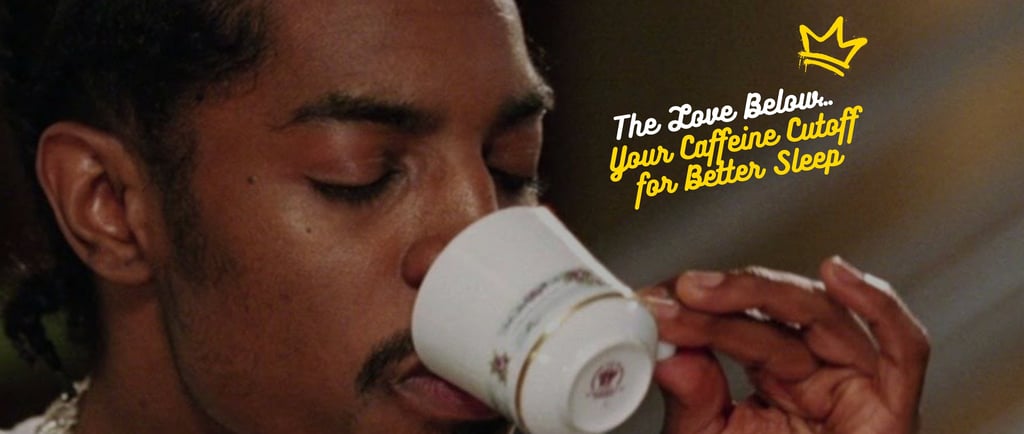The Love Below: Your Caffeine Cutoff for Better Sleep
From studio sessions to late-night sets, caffeine is the creative fuel for many artists—but timing is everything. Caffeine Timing for Peak Energy and Better Sleep breaks down how to use caffeine strategically for focus and performance, without sabotaging your sleep. Learn the best times to sip, how much to take, and smarter ways to energize so you can stay sharp, recover well, and keep your creativity flowing.
SLEEPCAFFEINE
dj miss kittie
5/14/20253 min read


Caffeine Timing for Peak Energy and Better Sleep: A Guide for Artists & DJs
Caffeine is often the unsung hero of the creative world, powering late-night studio sessions, early-morning travel, and everything in between. For artists who rely on coffee, energy drinks, or tea to fuel their work, finding the right balance can be tricky. Too much caffeine or poor timing can disrupt your sleep, leaving you drained when you need energy the most. This guide explores how to optimize your caffeine intake for peak performance without sacrificing your rest.
How Caffeine Works in the Body
Caffeine stimulates your central nervous system by blocking adenosine, a chemical that promotes sleepiness. This gives you the alertness and energy boost you crave but comes with a catch,,,
Caffeine has a half-life of about 2-12 hours, meaning half of it remains in your system long after consumption.
That means if you drink 200 mg of caffeine (roughly a 16 oz coffee) at 4 PM, about 100 mg could still be in your body at 10 PM, potentially disrupting your sleep cycle.
Benefits of Caffeine for Artists
Enhanced Focus and Productivity
Caffeine improves alertness and concentration, making it easier to focus during creative sessions or performances.
Boosted Physical Energy
For DJs, rappers, or producers with physically demanding schedules, caffeine provides the energy needed to keep up.
Improved Mood
Small to moderate doses of caffeine can increase dopamine production, boosting your mood and motivation.
The Downside of Poor Caffeine Timing
Sleep Disruption
Consuming caffeine too late in the day can delay sleep onset, reduce sleep quality, and shorten deep sleep stages, which are crucial for recovery.
Energy Crashes
Overconsumption can lead to jitteriness, anxiety, or an inevitable energy crash, affecting both performance and creativity.
Tolerance Buildup
Regularly consuming high doses of caffeine may make your body less responsive to its effects, requiring more to achieve the same boost.
Optimal Caffeine Timing for Artists
1. Time Your First Cup Strategically
Avoid caffeine within the first hour of waking. Your body naturally produces cortisol (the wakefulness hormone) in the morning, so delaying caffeine allows your body’s natural rhythms to do their job.
Ideal timing: 30-90 minutes after waking.
2. Cut Off Caffeine Early in the Afternoon
To avoid sleep interference, stop consuming caffeine 6-8 hours before bedtime. For example, if you aim to sleep at midnight, your last cup should be no later than 4-6 PM.
3. Use Caffeine Strategically During Late Nights
If you have a late-night show or session, opt for a smaller dose (50-100 mg) to avoid overloading your system. Pair this with a post-performance wind-down routine to signal to your body that it’s time to relax.
Tips for Managing Caffeine Intake
1. Know Your Limits
Moderate caffeine intake (200-400 mg per day) is generally safe for most adults. Exceeding this can lead to overstimulation, anxiety, and sleep disruption.
2. Choose the Right Source
Coffee and tea provide natural sources of caffeine with additional health benefits like antioxidants. Avoid sugary energy drinks, which can cause rapid energy spikes and crashes.
3. Use "Caffeine Naps"
Drink a small cup of coffee (50-100 mg), then immediately take a 15-20 minute nap. The caffeine kicks in as you wake, leaving you refreshed and alert.
4. Track Your Sleep and Energy
Use apps or journals to track how caffeine affects your energy levels and sleep. This can help you fine-tune your intake.
5. Hydrate and Eat
Always pair caffeine with water and food to prevent dehydration and stabilize blood sugar levels, reducing jitters and crashes.
Alternatives to Caffeine for Energy
If you’re trying to cut back on caffeine or need an extra boost without disrupting sleep, consider these options:
Adaptogens: Herbs like ashwagandha or rhodiola can reduce fatigue and improve focus.
L-Theanine: Often paired with caffeine, this amino acid promotes calm, focused energy without jitters.
Exercise: A quick walk or stretch can boost circulation and energy naturally.
Hydration: Dehydration often mimics fatigue—drink water or electrolyte-rich beverages for a natural pick-me-up.
Conclusion
Caffeine can be a powerful ally for artists when used mindfully. By understanding how it affects your body and timing your intake strategically, you can enjoy its benefits without compromising your sleep or recovery. Remember, creativity thrives on a well-rested mind and body, so use caffeine as a tool to support—not replace—your self-care routine.
